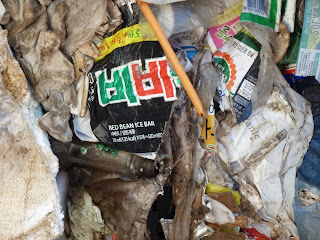Green Groups Hit CA Decision Favoring Garbage Dump in Manila Bay-Obando, Say Decision to Worsen Climate Change Impacts in the Area
Quezon City. As the world prepares for the Global Climate March come
September 21, green groups denounce a court decision favoring the operation of
a privately-owned garbage dump in the Manila Bay – Obando area, an area that is
highly susceptible to the impacts of climate change.
Early last week, stories of the Court of Appeals
decision giving the green light for the resumption of the construction and
operation of the much criticized 45-hectare Obando Sanitary Landfill hit the news.
The landfill is being built in a mangrove forest area in Manila Bay, in a
coastal fishing village in flood-prone Obando, Bulacan.
“The CA made a bad decision that boggles the mind
in many respect. While we have much to talk about in disagreement with the CA
decision, a more pressing concern now is that the ruling will greatly
exacerbate the impacts of climate change in the highly vulnerable town of
Obando and the entire Manila Bay,” said Aileen Lucero, National Coordinator of
EcoWaste Coalition, a broad zero waste advocacy alliance.
“The solution to our growing garbage crisis is
clearly not the creation of more dumps, such as landfills, as this merely
delays massive contamination of the environment and debilitates the capacities
of the affected communities, but the genuine enforcement of R.A. 9003,” Lucero
added.
EcoWaste Coalition maintained that Republic Act
9003, the Ecological Solid Waste Management Act, is very clear in its mandate to
enforce ecological solid waste management to divert wastes from ending up in
dumps, through segregation at source, reusing, recycling, composting, listing
and prohibition of non-environmentally acceptable products, and establishment
of materials recovery facilities. If properly done, this will reduce wastes greatly,
making landfill operations economically unviable.
Cheen Layman of Obando Kami ay Para sa Iyo (OKAPI), one of the local groups in Obando actively opposing the landfill, also assailed the ruling, saying, “the CA decision virtually sentenced us to death, as it will adversely affect the livelihood of thousands of fishing families in Obando – Malabon – Navotas area and seriously disturb the remaining mangrove forest and breeding grounds of sea life, weakening the people’s capacities against extreme climate events.”
For his part, Paeng Lopez of the Global Alliance for Incinerator Alternatives said that
“landfills are the largest global source of human-created methane, a toxic
climate-changing gas that is 25 to 72 times more potent than carbon dioxide,
thereby contributing immensely to climate change.”
Flooding is prevalent in the area even without
extreme weather events, and dislodging sea water by a 45-hectare landfill would
worsen the flooding, at the same time, exposing the affected communities to catastrophic
health and environmental risk ‘time bomb’ that could be triggered by extreme
weather events and similar occurrences, such as an earthquake, the groups noted.
In October 2011, in response to a query by the
EcoWaste Coalition, PHIVOLCS Director, Renato Solidum, stated that Obando is
susceptible to a host of weather and climate-related events, such as flooding,
storm surges, even liquefaction, earthquake, and tsunami.
A published study by Kelvin Rodolfo and Fernando
Siringan also point out that the Manila Bay area is susceptible to waves as
high as 3.7 meters brought about by mere southerly winds, such that even the US
Navy declared the bay an unsafe haven during typhoons.
The concerned area in Manila Bay is, at present,
the site of the mountain-like 45-hectare Navotas Sanitary Landfill, towering
above the remaining mangroves around it and “stinking like hell,” as one lead
figure in Obando described it. During the early 2000s, the same area became the
home of the Navotas Controlled Disposal Facility until its operation was
forcibly stopped by a river barricade set up by the people of Obando to prevent
garbage-carrying barges from reaching the dump area.
Recently,
during the grilling of Environment and Natural Resources Secretary, Ramon Paje,
over the perennial trash in Manila Bay, Senator Legarda similarly observed that
“Manila Bay is becoming the garbage dump of three regions around Manila.”
-end-




Comments